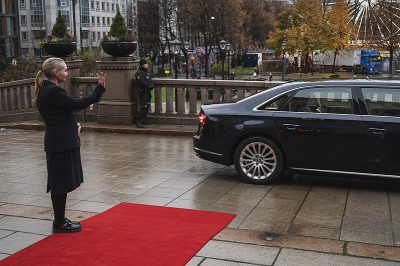NEWS ANALYSIS: Just six weeks into his role as Norway’s prime minister, Jonas Gahr Støre has struggled to lead the country, his government and even his own Labour Party. He landed a state budget deal on Monday, but criticism has been flying literally from left to right and even traditional supporters of Labour think it’s been “painful” to watch the party descend into new “chaos,” both internally and in public.

There’s no question Støre’s government got off to a bad start last month. He failed to form the majority g0vernment he’d sought throughout the campaign with both the farther-left Socialist Left Party (SV) and the Center Party. He wound up with just Center, which is often accused of being populist, protectionist and a challenging partner for Labour. Their platform drew instant criticism and little enthusiasm.
Then Støre and his new line-up of government ministers were robbed of a cheerful victory and team-building celebrations when tragedy struck on the very day they first walked out of the Royal Palace. Støre’s new 28-year-old justice minister had to deal with a mass murder in Kongsberg that challenged police and preparedness, and hurled the country into grief.
Then they had to quickly revise the former Conservatives-led state budget proposal, and their revision was met with loud protests from SV. Labour and Center then had to negotiate with SV, well into overtime. Støre and the other party leaders from Center and SV stepped in during the weekend in an effort to break the deadlock and finally managed to settle on a new state budget proposal, just in time for Thursday’s scheduled debate in Parliament.
It’s crucial for Støre to succeed in this first major test of his leadership capabilities. Negotiators put a positive spin on the budget process with Kari Elisabeth Kaski of SV claiming Monday morning that they “worked well through the weekend with the party leaders.” She could claim several victories on behalf of SV’s, the Greens’ and the Reds’ positions Monday evening, including higher taxes and even managing to cancel the next round of oil field licensing that would have opened up the North-, Norwegian- and Barents Seas to more oil and gas exploration.
That marks a major victory for opposition parties on the left and climate activists, but a loss for the pro-oil Labour and Center parties. Now they all must take their deal back to their three respective parties, and there’s bound to be objections.The budget proposal is nonethless likely to prevail – for better or worse for Støre’s minority government that still wants to develop, not phase out the oil industry.
Støre’s own ‘Black Week’
Meanwhile, Støre has just suffered through what commentator Hege Ulstein in newspaper Dagsavisen called a “Black Week” of his own. She noted during the weekend how Monday was spent being criticized by medical professionals who don’t think either Støre or Health Minister Ingvild Kjerkol are being tough enough on Corona containment measures. Even though Kjerkol was unveiling some new extended isolation rules and testing requirements on Monday, the government’s ability to lead the nation through another round of rising infection has been questioned more strongly by the day.
On “Black Tuesday” came not only more criticism of the tardy state budget process but also more accusations of broken campaign promises, not least Støre’s initial refusal to follow through on vacation pay for those laid off during the Corona crisis. That costs nearly NOK 2 billion, with taxes pushed through by SV now set to rise by just as much in order to avoid dipping into the Oil Fund. Center, meanwhile, seemed to win budget allocations to allow lower road-, fuel- and electricity fees at the expense of the climate, frustrating not just SV but also other Labour members.

Then came “Black Wednesday,” and the aftermath of Labour’s embarrassment when the party member it had chosen to be President of the Parliament had to step down after just over a month in the role. Eva Kristin Hanse, a veteran Labour MP from Trøndelag, was found to have exploited the Parliament’s own rules regarding its offer of free commuter housing in the capital, setting off more internal conflict within Labour over its choice of her successor. Not only did Hansen start complaining about feeling “forced” to resign, bitter and highly public complaints arose from those who felt overlooked for her job. That tore up old sores in a party long known for ugly power struggles that Støre has not succeeded in quelling.
“It’s painful to observe the Labour Party right now,” wrote Ulstein by “Black Thursday,” a remarkable comment in a newspaper that’s traditionally backed Labour editorially and was once even called Arbeiderbladet. “When (Hansen) had to quit … the party was thrown into chaos … and it’s worsened since then.” Hansen ended up hiring one of Norway’s most high-profile defense lawyers, and both budget and Corona chaos continued on “Black Friday.” Ulstein went so far as to call Støre “a pale shadow” of some other junior ministers who were doing their best to otherwise put Labour on the offensive, policy wise.
It’s all of Støre’s and Labour’s broken promises, though, that have grabbed the most headlines in recent weeks as Støre struggled to land the state budget. Støre reportedly was trying to satisfy trade union confederations’ demands that laid-off workers be paid out vacation pay after all, while others claimed the actual pay will amount to “crumbs” and would still force Støre to break another promise again raising taxes for another bloc of average wage earners.
Taxes have remained the biggest budget conflict with SV, which wanted to dramatically raise them for Norway’s wealthiest but also for everyone earning up to NOK 750,000 a year. Labour and Center had promised to shield them, but SV has only wanted tax relief for those earning less than NOK 600,000 (USD 67,000) a year. They settled on NOK 643,000. Things got worse for both Labour and Center when state statistics bureau SSB (Statistics Norway) reported that a new study indicates that Norway’s wealthiest pay less overall tax than even in the US. That’s also because Norway has many high regressive taxes that are the same for everyone, no matter how much they earn, skewing a more fair distribution of the tax burden.

That also collides with Labour’s and Center’s promise that it’s “ordinary folks’ turn” to prevail in budget negotiations. They’ve never been able to define exactly who Norway’s “ordinary folks” really are, but many Oslo residents at least were deeply disappointed when Center broke its promise to save the capital’s sprawling Ullevål Hospital, the largest in the country. The government won’t stop plans to move it adjacent to the National Hospital, tear most of it down at its current central site, and likely sell it to real estate developers.
Støre’s new government also wanted to delay its promise of finally including dental care in part of the national health program, at least for young adults and those with low incomes. SV and the Reds have lobbied hard for dental care, and they managed to ressurrect it in the state budget. Promises have also been broken already over funding for mental health counseling and more funding for student housing.
SV and lots of voters all over the country were also disappointed when Labour broke its promise to create new national parks. The government suddenly wouldn’t promise any of the 11 parks proposed to protect and preserve important nature. It appears Labour gave in to Center and its rural constituency, which always lodges objections over preservation of land that can be used for timber, hunting, grazing, agriculture or other economic activity.
Støre has predictably defended his new government in the midst of all the criticism and challenges so far, claiming it and he will “take Norway in a new direction,” away from the former Conservatives-led government that held power since 2013. He insists his government is doing “exactly what we said we’d do: Halt the rise in social differences among Norwegians, get more people in the workforce, strengthen Norway’s social welfare system and carry out “fair climate policy that cuts emissions and creates jobs.”
In a commentary in newspaper Dagsavisen, Støre responded to his critics by pointing to his plan for his first 100 days in office, with 40 issues he intends to tackle. Little things like doubling the deduction members of trade unions get for their union dues illustrate, he claims, his government’s “new course.” He still intends to offer more state funding to local governments, which are responsible for important social services like health- and elder care. He still claims his government will speed up the process of moving Norway in a “greener” direction too, and less dependent on the oil industry.
“I’m proud to lead a government that put ordinary folks first, and turns words into action,” Støre wrote. “Many plans have been put forward, and I look forward to continue the work.”
newsinenglish.no/Nina Berglund

